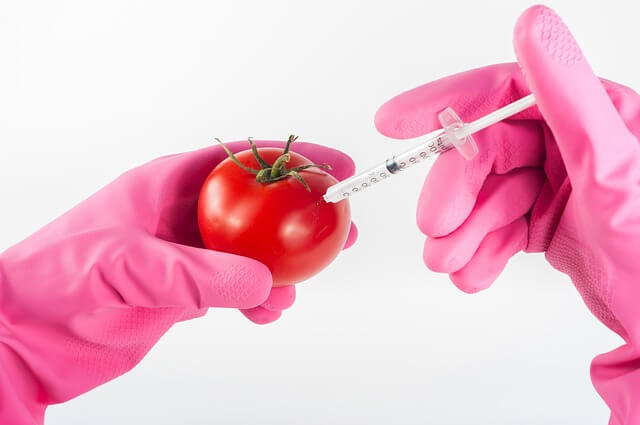Selective breeding, practiced for generations, has resulted in individuals who no longer resemble their pre-domesticated ancestors. Substantial exhibition of favored traits by an individual makes them suitable for selection. Their successive breeding results in a more distinct demonstration of the feature in descendants resulting in genetic modification. Therefore, every organism in the present day is considered genetically modified in one way or the other. If so, why are Genetically Modified Organisms (GMOs) never out of the debate?
Organisms whose genome is altered through the insertion or deletion of genes using bio-engineering techniques are considered to be modified genetically. The ultimate aim of modification is to introduce traits unpossessed naturally by species rather introduced from the same or different species, sometimes unrelated organisms like bacteria. Unlike selective breeding, the production of GMOs is hardly based on chances rather it requires the use of scientific laboratory experiments with precise methods. Despite the time reduced for the improvement of an organism, the process is considered unethical as it involves experimentation on a greater number of organisms during modification.
Are GMOs Boon?
With an alarming 8 billion global population, the need for pest-resistant, climate-resilient, and nutritionally enriched crops are rising to tackle hunger and malnutrition. With shrinking cultivable land, GMOs are suggested as a panacea.
In the 1990s, papaya yield in Hawaii was heavily damaged by the Ringspot virus. The introduction of genetically modified virus-resistant ‘Rainbow Papaya’ protected farmers from substantial economic damage. Genetically engineered ‘Golden rice’ capable of beta–carotene biosynthesis, a precursor of vitamin A played a significant role to fight night blindness in sub – Saharan Africa and South Asia. The invention of ‘Purple Tomato’ with a higher level of anthocyanin has increased shelf life and protected plants from UV damage and pathogens. In 2013, Bangladesh introduced Bt brinjal (Bacillus thuringiensis’ genes incorporated, capable of Bt toxin production) to fight vegetable losses due to insect infestation. Along with the economic advantage, 80% of insecticide application was reduced protecting the health of farmers and the environment.
Similarly, genetic modification is taking a leap in the livestock sector and mitigation of climate change impacts. Invented by the company AquaBounty, GM salmon reaches its marketable size within 18 months shortening the harvest period to half the natural duration. American Chestnut trees modified to mitigate the impact of climate change are better carbon sequestrators.
Or Bane?
Despite numerous advantages, people still consider GM foods as ‘monster food’, ‘Franken food’ or ‘mutated & poisonous’. Research suggests, unnatural changes in plants through genetic engineering alter the protein metabolism or metabolic pathways in food resulting in the unexpected production of toxins and allergens. Similarly, the CRISPR technique of gene editing and gene silencing practiced during the process have long-lasting effects on the genome of an organism.
Genetically engineered Roundup Ready Soybeans have the capacity to withstand the herbicide ‘glyphosate’. Cultivation of these herbicide-resistant crops has skyrocketed the herbicide application and soil health is in great danger. A significant amount of residue level has also been reported in the groundwater table.
Project ‘TARGET MALARIA’, funded by Bill and Melinda Gates Foundation, incorporates self-limiting genes into female mosquitoes making them unable to reach adulthood. It aims to control vector population & reduce cases of malaria. But, researchers comment on the production of more robust mosquitoes with short growth periods and greater viability for disease transmission because of genetic modification.
In 1997, South Africa legalized the introduction of GMOs. Within two decades, almost all soybean, maize, and cotton produced in the country are genetically modified. Monoculture of GMOs has resulted in the erosion of vast species diversity. Also, anti-GMO activists like Vandana Shiva argue that companies promoting GM foods mask the importance of nutritionally adequate indigenous crops. Four seed companies viz. Bayer, Corteva, ChemChina, and Basf hold 60% of the global seed market share. Due to their monopoly in prices, farmers are obliged to pay higher prices. Newly designed GM crops once patented as intellectual property, forbid farmers to save seeds for the next generation. Even if the pollens are blown from neighboring fields, farmers are sued to pay heavy fines or purchase licenses.
Hence, GMOs have served the purpose of earning more profit for multinational companies rather than providing food for the poor.
Conclusion
The introduction of GMOs in any country should be based on biosafety reports. For the safe consumption of GM foods, risk assessment of modified products must be imposed as a legal obligation along with well-labeled information for consumers. Incautious use of GMOs can serve as a good servant and a bad master. Instead of prioritizing their monoculture, technology should be used as an ally to sustain the ecosystem. The ethical relationship between humans and the environment should be emphasized. Genetic modification as an ultimate solution to fight hunger is a false myth. Polyculture, agroforestry, integrated pest and weed management, and efficient nutrient management are equally important.







